
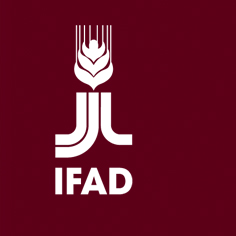
|
Country grants
The role of country grants in country programmes – message from Carla De Gregorio, Grants Coordinator, Asia and the Pacific Division Three years have passed since the Executive Board approved IFAD’s policy for grant financing, which included the creation of a country grants window. The intention was to use grant resources when they have a comparative advantage over loans and in ways that complement the loan programme. The grant instrument is now under review, and this newsletter seeks to highlight the value that country grants have added to IFAD’s programme of work in Asia and the Pacific region. Between 2004 and 2006, IFAD approved 46 regional and country grants for the Asia and the Pacific Region worth approximately US$21 million. Sixty per cent of new approvals were country grants, gradually increasing the number of grants in the region. The majority of country grants approved are for stand-alone projects not connected to the investment projects financed by loans. In the past three years, country grants have become an important financing instrument for country programme managers because of their versatile, flexible and innovative nature. Grants have proved to be particularly useful for the following reasons, some of which were highlighted in IFAD’s policy for grant financing:
Country grants have allowed country programme managers to have greater flexibility and innovative thinking in the pursuit of country programme objectives and in piloting new initiatives that might be too risky to pursue through loan projects. The articles in this special issue of the newsletter describe the value of country grants in the Asia and the Pacific region, as well as the results that they have produced in the past three years. The newsletter also presents some examples of the benefits deriving from supplementary funds for gender mainstreaming activities and from the linkages between regional grants and investment projects. Carla De Gregorio, Grants Coordinator, Asia and the Pacific Division Supporting policy dialogue and institutional changes in Viet Nam
Viet Nam’s success in economic reform, agriculture and rural development has been largely due to policy and institutional reform. The success of policy making and implementation requires the participation of stakeholders and an analysis of positive and negative impacts of different policy options. However, there are challenges such as lack of:
In reality, the main channel of supplying policy information to people is the administrative channel (from province to district, commune, hamlet and then to people). The main dissemination tools are documents such as dispatches and papers kept by the local authorities. People’s questions, comments or general feedback on policy go through the same administrative channels. IFAD is providing grant support for policy and programme development within the overall umbrella of the Decentralized Programme for Poverty Reduction. The decentralized development strategy works essentially when policies and programmes acquire local ownership and content. Hence, support for capacity building in local policy and programme development is crucial to underpin decentralization.
The ‘capacity-building for local policy and programme development sub-component’, financed through the IFAD grant, aims to improve the process of policy formulation and development by creating a system for collecting feedback from beneficiaries, evaluating the impacts of promulgated policies and analysing the feasibility of future policies. The sub-component also intends to improve the effectiveness of policy implementation by supporting policy dissemination, monitoring and evaluation and by mobilizing mass media The grant includes the following inter-linked activities:
The grant provides important resources to support processes, coordination and knowledge dissemination that could not be financed otherwise. It is helping poor rural people to participate in local and national policy processes – one of the objectives of IFAD’s Strategic Framework 2007-2010. Atsuko Toda, Country Programme Manager Read more about: Partnership for self-help development in rural Pakistan
Despite Pakistan’s heavy involvement in agriculture and livestock activities, the majority of small farmers, especially in rural Sindh, depend on subsistence farming. Although a promising demand for local and national marketing of these agricultural and dairy products exists, it has remained largely unexplored. This is due to low income levels and widespread poverty in the area. In May 2005, LEAD Pakistan, supported by a country grant from IFAD, addressed this problem through a pilot project titled Pilot Testing of a Public-Private Partnership to Develop Capacity for Small-Scale Agri-Business and Processing Enterprises. The project aims to improve the livelihood opportunities of small farmers in Thatta District, Sindh Province in the areas of livestock, dairy and aquaculture. The project area comprises nine villages in the district. It has mobilized 341 households (2,595 people, 45 per cent of whom are women) towards a self-help development approach, using the system of village assemblies (VAs) and farmer field trainings (FFTs).
FFT is a learning and capacity-building programme. It teaches practical techniques for managing a specific production system. Through the training sessions, farmers are guided to identify a particular enterprise they would like to undertake. To ensure that the FFT classes meet high-quality training standards, and are facilitating rather than instructional, LEAD has developed its own FFT training modules in consultation with field experts The six FFT modules focus on the following enterprises:
To date, the project has successfully completed the FFT on rice cultivation. As a result, the yield of the rice demonstration plot increased 119 per cent over the previous year. The yield of the plot compared to the control plot increased by 36 per cent. FFT classes on the remaining modules are currently underway. Two of the modules – goat rearing, and health and household development – have been designed exclusively for women based on the needs that the women expressed. During this short pilot period, the net investment of US$200,000 has reached approximately 2,595 people. This translates to approximately US$77 per person, US$587 per household and about US$22,000 per village. These are small investments given the type and quality of results that have started to materialize. Aisha Mansur, Assistant Coordinator, Project Management Office, LEAD Pakistan Read more about:
Rural microcredit in China: models for sustainability and replication
In 1986, Miao Xiaolian and her husband left their home in Qujiazhuang Village, Shaanxi Province to seek work in a nearby city. The couple returned to Qujiazhuang Village five years later because their income was too low to support themselves in the city. Upon their return, Miao and her family of four had no choice but to live in a cave. Unhappy about their situation, Miao wanted to improve her family’s living but did not know how.
In 2006, IFAD and Plan China saw the opportunity to develop the microfinance project beyond its primary role of increasing incomes. With IFAD’s grant support, the local microfinance associations received training in basic microfinance; selection of working areas and clients; management of products and services; and loan disbursement and repayment.
Miao participated in the training last year. She has now become the leader of the local microfinance office, where she teaches others about borrowing and investing. Miao encourages other people to attend microfinance meetings, trainings and discussions so that they can also access the resources that contributed to her success.
IFAD can learn from this pilot project about how grassroots-level organizations could be supported to become sustainable microfinance institutions. The adapted version of the microfinance model from Bangladesh used in this project can be scaled up to future IFAD-supported projects and programmes. In addition, the microfinance associations gained skills and experience that will enable them to expand their business further in the future. Francesca Celestre, Plan China, and Thomas Rath, Country Programme Manager Read more about: Building the capacity of national partners in monitoring and evaluation
The Global Development Group (GDG) is a Canadian-based organization experienced in providing M&E support and tools to development projects. GDG received a grant from IFAD which aimed to improve the overall quality and utilization of M&E and related systems within IFAD-supported projects, in particular, to increase the capacity of project staff in:
The grant covered China, Indonesia and Lao People’s Democratic Republic (PDR). In addition, GDG supported two RIMS workshops held in Bangladesh and the Philippines in 2005. Delegates from 12 countries and several projects participated in these workshops. Both workshops introduced RIMS to the projects – the underlying concepts, the RIMS questionnaire, the RIMS software and how to do anthropometric measurements. They also included a field visit to a nearby village to practice the interview part of the survey. Clearly, there are many advantages of grants:
The increased pressure on available financial resources also means that some, especially smaller, country programmes will often find it difficult to fund crucial management support activities such as training in M&E, RIMS and managing for development results. At the country level, the capacity in these areas is almost universally weak. Yet, it must be addressed to meet the requirement of IFAD and other donors and partners that M&E systems allow for a true evaluation and reporting of outcomes and impacts. It is important to note that the compliance requirements of grants are not vastly different from other funding mechanisms. Reports and financial data are still subject to verification and audit, and must be adhered to. What makes grants unique is their ability to address common problems with flexibility and an added scope within a given area. For example, if GDG had relied on regular project sources to conduct at least preliminary M&E assessments and RIMS training, it would have reached less than 50 per cent of the projects that were visited and whose M&E staff were trained with the grant support. Moreover, the countries involved had the added advantage of highly focused training in RIMS and M&E capacity-building activities. Instead of presenting universally applicable M&E information and concepts, the capacity building and M&E support was based on their particular project requirements. The IFAD grant mechanism adds value, not only to the grant recipients, but also to all stakeholders and IFAD as a whole as the lessons learned are shared across the organization. Sailesh Patry, Director, International Marketing and Programme Management and Eric Weiss, Senior M&E and RIMS consultant, Global Development Group Read more about:
Supporting the emerging organic agriculture sector in the Pacific
The potential of organic agriculture in the Pacific emerged during the preparation of the Sub-regional Strategic Opportunities Paper (SRESOP) approved by IFAD’s Executive Board in 2004. SRESOP found that most agricultural practices in the Pacific are organic de facto but not officially certified because of the high costs related to certification. Furthermore, in 2005, IFAD’s Office of Evaluation evaluated IFAD’s experience in organic agriculture in Asia in a study titled Organic Agriculture and Poverty Reduction in Asia. The study highlighted that the promotion of organic agriculture among small farmers can contribute to poverty reduction and should be a part of IFAD’s development programmes and strategies. Based on these findings, IFAD decided to engage in promoting organic agriculture in the Pacific. In partnership with the International Federation of Organic Agriculture Movements (IFOAM), IFAD developed a grant-supported project titled Building Capacities on Certification of Organic Agriculture. The two-year project covers all IFAD member countries in the Pacific. The project objectives are to:
The first year of project implementation focused on building networks with stakeholders and training them in raising awareness on organic agriculture. The fact that local stakeholders now understand the potential of organic agriculture is one of the project achievements. During the second Head of Agriculture and Forestry Services Meeting organized by the Secretariat of the Pacific Community (SPC) in September 2006, government representatives requested the Secretariat to take a lead in the region to promote organic agriculture in partnership with IFOAM and IFAD. Based on this request, IFAD approved another grant to support the Secretariat in establishing a local consultative process to finalize the regional standard for organic agriculture and to develop a strategic plan for promoting this sector in the Pacific. IFOAM will complete the study on the current situation of organic agriculture and fair trade production in the Pacific Island Countries by mid 2007. Based on this study, IFAD will explore directions for further support in promoting organic agriculture in the region. Ariko Toda, Country Programme Manager Read more about:
Supporting corridor development in Nepal
The Local Livelihoods Programme is an innovative initiative supported by IFAD. Its design is in line with the first strategic objective of IFAD’s Country Strategy Opportunity Programme (COSOP) for Nepal, which specifies “increased access to economic opportunities by poor farmers and producers in hill and mountain areas.” The programme is contributing to improving the livelihoods of at least 5,000 poor and disadvantaged families by enhancing market and economic linkages between hill and mountain areas in the North, and the Terai region and areas bordering India in the South.
The programme covers five districts in the mid-western region connected to two main North-South highways. As roads are being developed in the region, the programme aims to link agricultural production of communities to markets, thereby contributing to the development of corridors along the main roads. The programme is financing activities such as formation of community groups, promotion of high-value crops, training in marketing, and small-scale infrastructure such as micro irrigation and development of market centres. Experiences gained from the implementation of this programme will benefit IFAD’s ongoing investment programme in the mid-far western districts and its future activities in the agriculture sector in hill and mountain areas of Nepal. Nepal’s climatic conditions range from warm-tropical in the South to cold in the North. Hill and mountain areas in the North have unique potential to produce a range of different types of high-value agricultural and non-timber forest products. These products can be traded in Terai and the adjoining states of India, where climate is unfavourable to their production. However, the potentials have remained untapped due to poor physical infrastructure and road network linking the North and the South. Poor infrastructure left a vast majority of people living in hills and mountains in abject poverty. The mid-western region is the poorest of the five development regions of Nepal, with a poverty incidence of 45 per cent compared to the national average of 31 per cent. The project is implemented by the Center for Environmental and Agricultural Policy Research, Extension and Development (CEAPRED), a well known national NGO specializing in the promotion of commercial high-value agriculture. In less than a year of implementation, the project has already organized nearly 3,000 poor families in commercial production of vegetables, small livestock and non-timber forest products. Community members have been very interested in the programme. Their contributions to date have been significant in the construction of market led-infrastructure. Creating linkages between market players at the local, district and regional levels along the corridors will be one of the project’s priorities in the second year of implementation. Pius Raj Mishra, Executive Director, Center for Environmental and Agricultural Policy Research, Extension and Development Read more about:
Testing innovative market approaches in Viet Nam
Following Viet Nam’s accession to the World Trade Organization in January 2007, the Government of Viet Nam eliminated export subsidies, reduced tariffs, and improved hygiene standards and the protection of intellectual property rights. Given these developments, it is critical for IFAD’s country programme to focus on innovative areas such as:
IFAD’s grant assistance is responding to these needs by supporting two activities:
These grant activities will work in synergy with IFAD loan-supported projects through training and capacity building, development guidelines, workshops and visits. Grants are an invaluable resource for the country programme in Viet Nam. They allow innovative ideas to be tested that cannot be tried out in the context of an investment project. The innovations can also feed into and be scaled up by future investment projects. Atsuko Toda, Country Programme Manager Read more about: Centre de coopération internationale en recherche agronomique pour le développement (CIRAD) Creating new partnerships to improve the livelihoods of vulnerable communities in the Pacific Through a US$2 million grant, IFAD has started to re-engage with the Pacific Island Countries. The grant programme aims to contribute to improved and sustainable livelihoods of vulnerable communities, especially youth and women living in remote rural areas. During the consultative process with stakeholders in the Pacific in the preparation of the Sub-regional Strategic Opportunities Paper, IFAD found that many effective and innovative interventions in the Pacific are being implemented by a growing number of grassroots organizations. However, in many cases, these initiatives lack adequate capacity building and/or the financial support to expand and sustain the achievements of these organizations. The programme is actively establishing partnerships with other donors involved in community development. It has already set up field collaboration with programmes of the Australia and New Zealand Banking Group Limited, SPC, the United Nations Children’s Fund and the United Nations Development Programme. In September 2006, MORDI and the Good Governance Programme of FSPI organized and hosted a round table meeting with the Small Grant Donors of the Pacific Region to exchange experiences on providing small grants in the Pacific. Through the forum, donors also sought areas of collaboration to improve access by Pacific communities to these grants and to increase grant effectiveness. Since the first round table, Small Grant Donors meetings have been held periodically. Ariko Toda, Country Programme Manager Read more about:
Rice landscapes management: improving livelihoods and the environment in Asia’s uplands
Rice is an important staple crop grown in the uplands. Increasing the productivity of land and labour in growing rice is therefore a critical entry point promoting income generation and environmental protection. Increased rice productivity can:
Managing Landscapes in Marginal Uplands for Household Food Security and Environmental Sustainability, a US$1,2 million grant project implemented by the International Rice Research Institute (IRRI), addresses these issues. The project, which started in 2005, aims to develop, validate and deliver technologies for improved management of rice landscapes. The project is being implemented in upland areas of Lao PDR, India, Nepal and Viet Nam. IRRI and national partners in these countries are validating and disseminating improved rice varieties together with complementary management technologies to produce higher yields in sloping uplands and in upland paddies.
In addition, the project evaluated Lao local varieties from other areas and from rice germplasm banks. These varieties give higher yields than the local varieties currently grown in the project areas. Seeds of these local varieties are being multiplied and provided to farmers for wider validation and use. In 2006, the grant project supplied 1,500 kg of seeds of improved varieties and landraces to 150 farmers in 22 villages for an initial demonstration. These farmers are now expanding the area to grow these varieties. Neighboring farmers are also interested and have obtained seeds from last year’s harvest. Thus, the dissemination of these varieties at the village level has already commenced. Alternative cropping systems are being explored to identify crop combinations and rotations with upland rice that reduce soil erosion and weed infestation, improve soil fertility and generate income. These alternative systems include rotations such as rice-pigeon pea, rice-rice beans and rice-paper mulberry. They are also being validated and made available to farmers. An innovative feature of the project is its strong link with two IFAD-funded investment initiatives: the Rural Livelihoods Improvement Programme in Sayabouri and the Oudomxai Community Initiatives Support Project. In October 2005, IRRI and national partners organized a workshop in Oudomxai to link these investment projects with the grant project. Staff from both projects together with local agricultural officials participated in the workshop. They developed a workplan for validating the technology and transferring it to the villages supported by the investment projects. Through the grant support, provincial staff involved in the investment projects received training in designing demonstration trials and collecting farmer feedback on the performance of improved varieties. Eleven provincial and district agricultural officials received training to set up community-based seed multiplication systems for disseminating improved varieties rapidly. The grant project also facilitated the study tour of local agricultural officials in Oudomxai and Sayabouri to Yunnan in China. The tour exposed them to successful agricultural development approaches in the uplands of Yunnan. Project directors of investment programmes are regularly invited to the annual review and planning meetings of the grant project to strengthen this collaboration. Furthermore, regular meetings and contacts are taking place between staff involved in grants and investment projects. Thus, the grant project is directly contributing to the investment projects through the provision of technical support and training. Sushil Pandey, Project Leader, Agricultural Economist and Deputy Head of the Social Sciences Division, IRRI Read more about:
Building the sustainability of rural poor organizations
In 2005, SCOPE conducted a desk review of IFAD projects. It also published the experiences of civil society organizations in a book titled ‘IFAD’s experience in building and strengthening rural poor organizations in Asia’. A major finding was that projects are lacking exit strategies to address the sustainability of RPOs. A similar finding was cited in IFAD’s 2004 External Evaluation: “a minority of projects are likely to be sustainable”. These findings prompted IFAD’s Asia and the Pacific Division to approach SCOPE to assist five IFAD-supported projects with RPO sustainability:
Through a series of meetings and consultations with the directors of the five projects and IFAD’s country programme managers in the countries, SCOPE identified indicators and strategies for the sustainability of RPOs. Guided by SCOPE, the projects used the indicators and strategies and developed sustainability plans for RPOs within their respective project time frames. However, the project directors identified constraints in implementing their sustainability plans:
To date, SCOPE has provided grants to four of the five projects to support their capacity-building initiatives as a means towards RPO sustainability. Although the grants were very small (averaging US$20,000 per project), the project directors appreciated the positive impact that the grants had on their projects. The original design of the Sunamganj Community-Based Resource Management Project in Bangladesh had no provision for capacity building. Through the grant, the project has been able to train and deploy 15 community development facilitators, who will carry on working with community groups/RPOs after the project ends. A needs assessment initiated by SCOPE in early 2006 identified the lack of skills of PIDRA-assisted RPOs and PIDRA staff to undertake and manage economic activities. Consequently, the SCOPE grant focused on building the microfinance and micro-enterprise capacity of PIDRA staff and partner NGOs through training interventions. In the Rural Poverty Reduction Programme in Mongolia, the grant helped to strengthen the capacities of RPOs, specifically the Rangeland Monitoring and Management Committees in two bags (smallest rural administrative units) of two Soums (rural districts) in Arkhangai Aimag province. Training was conducted in participatory approaches, and exchange visits are being planned between the two Soums to encourage further learning. The programme would like to use these two bags as model groups for other areas that it covers in an effort to reduce poverty, manage natural resources, develop women’s skills and improve health services. In the Northern Mindanao Community Initiatives and Resource Management Project in the Philippines, the grant has helped to form provincial core groups that will continue working with RPOs and other stakeholders when the project ends. Flory Tabio, Project Coordinator, ANGOC Read more:
Financing capacity building in gender mainstreaming in Lao People’s Democratic Republic
The Lao Women’s Union (LWU) has led the gender mainstreaming process in the IFAD-supported Oudomxai Community Initiatives Support Project. However, LWU had difficulties in formulating relevant activities to mainstream gender and to address gender needs. To address this issue, IFAD provided technical support to LWU through the Asian Institute of Technology. A gender training session was held for leaders in Oudomxai province. Support from the provincial authorities has encouraged LWU to proceed further in the gender mainstreaming process. Subsequently, the project engaged in capacity building, organizing a gender planning workshop for provincial and district officers and LWU. The project identified gender issues and activities to address them, both of which were included in the annual work plan. LWU’s weak capacity in administrative tasks has contributed to its lower status in the province, which presents a large barrier for LWU in promoting and leading the process of gender mainstreaming. To focus on capacity building for LWU, a workshop on reporting, setting indicators and monitoring was held through the grant activities. Such technical support, with a special focus on supporting LWU to drive the gender mainstreaming process, has empowered LWU in Oudomxai province. Moreover, LWU has shared its experience with LWUs in other provinces.
These experiences show that creating a supportive environment and providing a little technical assistance to boost confidence and provide initial ideas on gender mainstreaming can have a ripple effect in other provinces.
According to Khammy Souksavath, President of the provincial LWU in Oudomxai, learning gender mainstreaming techniques and implementation procedures, and strengthening institutions in gender mainstreaming are the most significant benefits gained by IFAD’s technical assistance through the Asian Institute of Technology. Kyoko Kusakabe, Associate Professor, Gender and Development Studies, School of Environment, Resources and Development, Asian Institute of Technology Read more about: Activating gender mainstreaming processes in village and communes in Cambodia In Cambodia, gender mainstreaming initiatives have been discussed and implemented since the mid-1990s. Cambodia is fortunate to have a Ministry of Women’s Affairs, a national gender strategy and other high-level policy documents that emphasize gender issues. However, such initiatives at the central level are not well-reflected in villages and communes, even though there is a women-and-children focal point at the commune level. Through the Asian Institute of Technology, IFAD provided a technical support grant of US$47,500 to address this problem. The IFAD-supported Rural Poverty Reduction Project in Prey Veng and Svay Rieng has a strong gender component. The Ministry of Women’s Affairs (MoWA) leads of the project’s gender mainstreaming activities. The Ministry of Agriculture Forestry and Fishery is also an important player. From the beginning, the project focused on the most crucial missing link in gender mainstreaming: the gender mainstreaming process at the village and commune levels. Project staff and MoWA reviewed the current agriculture training manual and made it more ‘contextualized’ by using case studies from villages in the project area. They developed flip charts to make the information and education activities of women-and-children focal points easier. Using the flip charts, the focal points found it easier to share and discuss the information with villagers. MoWA also reviewed the roles and responsibilities of project staff to ensure that gender mainstreaming becomes the responsibility of all stakeholders and to clarify concrete actions and coordination needed to carry out gender mainstreaming activities. With technical assistance from the Asian Institute of Technology, the project has also developed a monitoring format and system that includes more descriptive qualitative information for the monitoring report. The aim of this initiative was to develop a monitoring system that not only follows up the gender mainstreaming activities, but also builds capacity of district- and commune-level focal points to carry out gender analysis. The focal points reported that this clarification of roles and responsibilities and the new reporting format enhanced their cooperation with commune extension workers, whose role is to carry out major extension work in the villages, to collect information and to contact farmers. The above gender mainstreaming initiatives have been published in a booklet for sharing and dissemination among government officers and NGO workers in Cambodia. Kyoko Kusakabe, Associate Professor, Gender and Development Studies, School of Environment, Resources and Development, Asian Institute of Technology Read more about:
|
![]()
|
|
[email protected] Martina Spisiakova
Carla De Gregorio
Making a Difference in Asia and the Pacific Issue 15: Issue 14: January/February 2007 - Sustainable natural resource management Issue 13: November/December 2006 - PBAS: looking beyond the resource allocation system Issue 12: September/October 2006 - Communication for poverty reduction and rural development Issue 11: July/August 2006 - Working with UN agencies at the country level Issue 10: May/June 2006 - Indigenous peoples and ethnic minorities Issue 9: March/April 2006 - Access to land Issue 8: January/February 2006 - Agricultural Technology Management Issue 7: November/December 2005 - Pro-poor policies Issue 6: September/October 2005 - Gender & MDGs Issue 5: July/August 2005 - Partnership Issue 4: May/June 2005 - Rural Finance Issue 3: March/ April 2005 - Donor Harmonization Issue 2: January/ February 2005 Issue 1: November/ December 2004
Porftolio review workshop – 9-12 May 2007 Start-up workshop – Tejaswini Rural Women’s Empowerment Programme, June 2007 Indonesia Maldives Viet Nam Country programme review – 19-20 June 2007 Regional training in financial management – 21-22 June 2007
Afghanistan BhutanImplementation support mission – Agriculture Marketing and Enterprise Promotion Programme, April-May 2007 Cambodia Supervision mission – Community-Based Rural Development Project in Kampong Thom and Kampot, 22 April - 4 May 2007 Preparation mission for mid-term review – Rural Poverty Reduction Project in Prey Veng and Svay Rieng, 28 April - 3 May 2007 Design and consultation mission for COSOP – 12-25 May 2007 China Mid-term review mission – Rural Finance Sector Programme, April-May 2007 Appraisal mission – Agriculture, Market Access and Rural Financial Services Promotion Programme in Inner Mongolia Autonomous Region, May-June 2007 Democratic People’s Republic of Korea Supervision, policy dialogue and programme development mission – Uplands Food Security Project, 15-30 June 2007 India Joint IFAD/UNOPS review mission – Orissa Tribal Empowerment and Livelihoods Programme, May 2007 Inception mission – June 2007 Formulation mission – Poverty Alleviation Project in Rajasthan, July 2007 Indonesia Pre-appraisal mission – National Programme for Community Empowerment, April-May 2007 Follow-up mission – Post-Crisis Programme for Participatory Integrated Development in Rainfed Areas, 28 May - 11 June 2007 Appraisal mission – National Programme for Community Empowerment, 8-30 June 2007 Iran Kyrgyzstan Mongolia Philippines Viet Nam Appraisal mission – Programme for Development of Market Opportunities for the Poor, June-July 2007 |
![]()
The International Fund for Agricultural Development (IFAD) is a specialized agency of the United Nations, dedicated to eradicating poverty and hunger in developing countries. Its work in remote rural areas of the world helps countries achieve the Millennium Development Goals. Through low-interest loans and grants, IFAD develops and finances projects that enable rural poor people to overcome poverty themselves.
IFAD tackles poverty not just as a lender, but as an advocate for the small farmers, herders, fisherfolk, landless workers, artisans and indigenous peoples who live in rural areas and represent 75 per cent of the world's 1.2 billion extremely poor people. IFAD works with governments, donors, non-governmental organizations, local communities and many other partners to fight the underlying causes of rural poverty. It acts as a catalyst, bringing together partners, resources, knowledge and policies that create the conditions in which rural poor people can increase agricultural productivity, as well as seek out other options for earning income.
IFAD-supported rural development programmes and projects increase rural poor people's access to financial services, markets, technology, land and other natural resources.
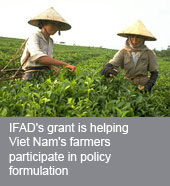 In 2004, IFAD provided a US$630,000 grant to support the Government of Viet Nam in building its capacity for local policy and programme development. The grant aims to promote an inclusive policy dialogue process that is province-led and to support Viet Nam’s overall decentralized development strategy. The grant is embedded within the Decentralized Programme for Poverty Reduction in Ha Giang and Quang Binh Provinces, a US$38.8 million programme approved by IFAD’s Executive Board in December 2004.
In 2004, IFAD provided a US$630,000 grant to support the Government of Viet Nam in building its capacity for local policy and programme development. The grant aims to promote an inclusive policy dialogue process that is province-led and to support Viet Nam’s overall decentralized development strategy. The grant is embedded within the Decentralized Programme for Poverty Reduction in Ha Giang and Quang Binh Provinces, a US$38.8 million programme approved by IFAD’s Executive Board in December 2004. 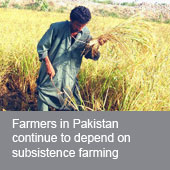 Low income levels and widespread poverty in some areas of Pakistan impede farmers from marketing agriculture and livestock products. Consequently, farmers continue to depend on subsistence farming. Supported by a country grant from IFAD, LEAD Pakistan – a non-profit organization of LEAD International – initiated a pilot project titled Pilot Testing of a Public-Private Partnership to Develop Capacity for Small-Scale Agri-Business and Processing Enterprises. This US$200,000 project aims to improve the livelihood opportunities of small farmers in Thatta District, Sindh Province in the areas of livestock, dairy and aquaculture.
Low income levels and widespread poverty in some areas of Pakistan impede farmers from marketing agriculture and livestock products. Consequently, farmers continue to depend on subsistence farming. Supported by a country grant from IFAD, LEAD Pakistan – a non-profit organization of LEAD International – initiated a pilot project titled Pilot Testing of a Public-Private Partnership to Develop Capacity for Small-Scale Agri-Business and Processing Enterprises. This US$200,000 project aims to improve the livelihood opportunities of small farmers in Thatta District, Sindh Province in the areas of livestock, dairy and aquaculture. 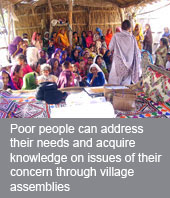 LEAD is a pioneer of the VA approach in Pakistan. It is a consensus-building approach used independently for males and females to collectively identify their development and social needs, and to select those needs that are in line with the project objectives. In this project, the VA has primarily been used to:
LEAD is a pioneer of the VA approach in Pakistan. It is a consensus-building approach used independently for males and females to collectively identify their development and social needs, and to select those needs that are in line with the project objectives. In this project, the VA has primarily been used to: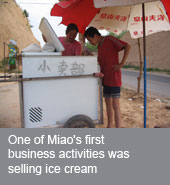 In Shaanxi Province in China, a US$80,000 grant helped grassroots organizations to become sustainable microfinance institutions. With the grant support from IFAD, local microfinance institutions received training in basic microfinance; selection of working areas and clients; management of products and services; and loan disbursement and repayment. Ten organizations gained skills and experience which will enable them to consolidate and expand their businesses in the future.
In Shaanxi Province in China, a US$80,000 grant helped grassroots organizations to become sustainable microfinance institutions. With the grant support from IFAD, local microfinance institutions received training in basic microfinance; selection of working areas and clients; management of products and services; and loan disbursement and repayment. Ten organizations gained skills and experience which will enable them to consolidate and expand their businesses in the future.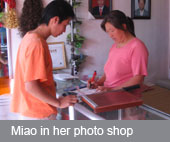 In 2002, Plan China – an international development organization – began a microfinance project in Qujiazhuang Village. Miao was the first woman to take out a loan. Her first loan was for RMB 600 (US$76). Within five years, Miao took out five small loans to start businesses such as cement mixing and a grocery store. These activities increased Miao’s income significantly. She is currently earning RMB 8,000 (US$1,013) per year, about four times more than before 2002.
In 2002, Plan China – an international development organization – began a microfinance project in Qujiazhuang Village. Miao was the first woman to take out a loan. Her first loan was for RMB 600 (US$76). Within five years, Miao took out five small loans to start businesses such as cement mixing and a grocery store. These activities increased Miao’s income significantly. She is currently earning RMB 8,000 (US$1,013) per year, about four times more than before 2002. 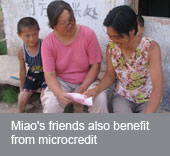 The training enabled each local microfinance association to create long-term, annual, and action plans to guide their work. The improvement of microfinance services led to a 101 per cent increase in the number of local applications for microfinance loans in 2006.
The training enabled each local microfinance association to create long-term, annual, and action plans to guide their work. The improvement of microfinance services led to a 101 per cent increase in the number of local applications for microfinance loans in 2006.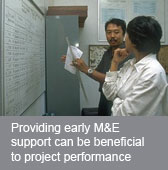 The outreach of grants and the speed with which they can be used are distinct advantages compared to loans. This can particularly apply to funding training such as in monitoring and evaluation (M&E), results-based management and managing for development results. Through a US$128,000 grant, IFAD has been addressing these crucial areas to improve the quality and utilization of M&E systems in the projects it supports.
The outreach of grants and the speed with which they can be used are distinct advantages compared to loans. This can particularly apply to funding training such as in monitoring and evaluation (M&E), results-based management and managing for development results. Through a US$128,000 grant, IFAD has been addressing these crucial areas to improve the quality and utilization of M&E systems in the projects it supports.  In the Pacific region, IFAD is promoting the adoption of organic agriculture. Through a US$200,000 grant project titled Building Capacities on Certification of Organic Agriculture, IFAD is looking for feasible ways to reduce the high cost to farmers of certification, thus contributing to reducing their poverty. Through this assistance, IFAD will work with institutional systems to make access by farmers to organic agriculture easier. One year of grant implementation has shown positive results that have been recognized by the governments of the Pacific countries.
In the Pacific region, IFAD is promoting the adoption of organic agriculture. Through a US$200,000 grant project titled Building Capacities on Certification of Organic Agriculture, IFAD is looking for feasible ways to reduce the high cost to farmers of certification, thus contributing to reducing their poverty. Through this assistance, IFAD will work with institutional systems to make access by farmers to organic agriculture easier. One year of grant implementation has shown positive results that have been recognized by the governments of the Pacific countries.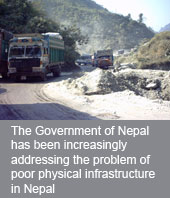 In its Tenth Plan and the National Agricultural Policy, the Government of Nepal introduced the concept of North-South corridor development. The purpose of the corridors is to link the economic potential that exists in hill and mountain areas of the North to the market in the Terai region and the adjoining states of India in the South. The Local Livelihoods Programme, funded by an IFAD grant of US$485,000, is a step towards operationalizing this concept.
In its Tenth Plan and the National Agricultural Policy, the Government of Nepal introduced the concept of North-South corridor development. The purpose of the corridors is to link the economic potential that exists in hill and mountain areas of the North to the market in the Terai region and the adjoining states of India in the South. The Local Livelihoods Programme, funded by an IFAD grant of US$485,000, is a step towards operationalizing this concept.  As rural development in Viet Nam adapts to increasing globalization, IFAD’s country programme has diversified its project portfolio towards market approaches for poverty reduction. Through grant assistance, IFAD is testing innovative approaches that would link poor rural households to supermarkets and integrate safe and off-season vegetable production with markets.
As rural development in Viet Nam adapts to increasing globalization, IFAD’s country programme has diversified its project portfolio towards market approaches for poverty reduction. Through grant assistance, IFAD is testing innovative approaches that would link poor rural households to supermarkets and integrate safe and off-season vegetable production with markets. 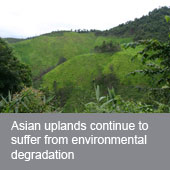 Much of Asia’s uplands are characterized by high incidence of poverty, caused by poor physical access to markets, ill-functioning marketing institutions and subsistence agriculture with low productivity. Rising population pressure and the consequent intensification of marginal areas for food production have contributed to environmental degradation and further reduced agricultural productivity. Upland areas are caught up in a vicious circle that perpetuates poverty, food insecurity and environmental degradation. A grant project titled Managing Landscapes in Marginal Uplands for Household Food Security and Environmental Sustainability aims to break this circle by using the concept of ‘improved rice landscapes management’. This initiative is also building linkages between IFAD’s grant- and loan-supported projects.
Much of Asia’s uplands are characterized by high incidence of poverty, caused by poor physical access to markets, ill-functioning marketing institutions and subsistence agriculture with low productivity. Rising population pressure and the consequent intensification of marginal areas for food production have contributed to environmental degradation and further reduced agricultural productivity. Upland areas are caught up in a vicious circle that perpetuates poverty, food insecurity and environmental degradation. A grant project titled Managing Landscapes in Marginal Uplands for Household Food Security and Environmental Sustainability aims to break this circle by using the concept of ‘improved rice landscapes management’. This initiative is also building linkages between IFAD’s grant- and loan-supported projects. 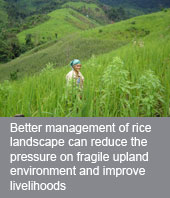 Lao PDR is a good example of the progress being made through this project. IRRI identified improved “aerobic” rice varieties suited to upland conditions that produce much higher yields than the varieties currently being grown. Their yield advantage is in the range of 1-1.5 tons per hectare, even without added fertilizers as compared to 1-1.2 tons per hectare yield of traditional varieties.
Lao PDR is a good example of the progress being made through this project. IRRI identified improved “aerobic” rice varieties suited to upland conditions that produce much higher yields than the varieties currently being grown. Their yield advantage is in the range of 1-1.5 tons per hectare, even without added fertilizers as compared to 1-1.2 tons per hectare yield of traditional varieties. 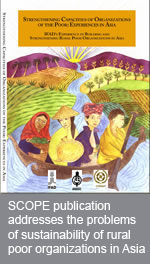 Strengthening Capacities of Organizations of the Poor: Experiences in Asia (SCOPE) is a three-year IFAD grant of US$450,000 implemented by the Asian NGO Coalition for Agrarian Reform and Rural Development (ANGOC) and the Centre on Integrated Rural Development for Asia and the Pacific (CIRDAP). Its overall goal is to enable poor rural people to form strong coalitions and federations. Recently, SCOPE has started to address the problem of sustainability of rural poor organizations (RPOs), especially with respect to project exit strategies.
Strengthening Capacities of Organizations of the Poor: Experiences in Asia (SCOPE) is a three-year IFAD grant of US$450,000 implemented by the Asian NGO Coalition for Agrarian Reform and Rural Development (ANGOC) and the Centre on Integrated Rural Development for Asia and the Pacific (CIRDAP). Its overall goal is to enable poor rural people to form strong coalitions and federations. Recently, SCOPE has started to address the problem of sustainability of rural poor organizations (RPOs), especially with respect to project exit strategies. 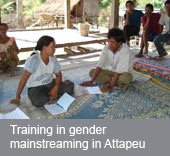 In Lao PDR, the word ‘gender’ has been heard for a long time, but gender mainstreaming initiatives have largely remained at the policy level. At the provincial level, the concept of gender mainstreaming is still considered to be new. Through the Asian Institute of Technology, IFAD has provided a grant to support gender mainstreaming in Oudomxai and Attapeu provinces of Lao People’s Democratic Republic (PDR). Not only has this initiative empowered the Lao Women’s Union in Oudomxai, it has also encouraged other provinces to follow.
In Lao PDR, the word ‘gender’ has been heard for a long time, but gender mainstreaming initiatives have largely remained at the policy level. At the provincial level, the concept of gender mainstreaming is still considered to be new. Through the Asian Institute of Technology, IFAD has provided a grant to support gender mainstreaming in Oudomxai and Attapeu provinces of Lao People’s Democratic Republic (PDR). Not only has this initiative empowered the Lao Women’s Union in Oudomxai, it has also encouraged other provinces to follow.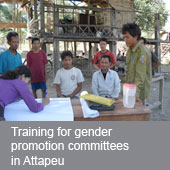 Learning about the progress of gender mainstreaming in Oudomxai also encouraged project staff of the IFAD-supported Rural Livelihoods Improvement Programme in Attapeu and Sayaboury. In Attapeu, the programme organized gender promotion committees in each village. The committees were comprised mainly of male leaders. In many villages, the formation of these committees became the first activity under the programme. It has created a lot of enthusiasm at the village level.
Learning about the progress of gender mainstreaming in Oudomxai also encouraged project staff of the IFAD-supported Rural Livelihoods Improvement Programme in Attapeu and Sayaboury. In Attapeu, the programme organized gender promotion committees in each village. The committees were comprised mainly of male leaders. In many villages, the formation of these committees became the first activity under the programme. It has created a lot of enthusiasm at the village level.